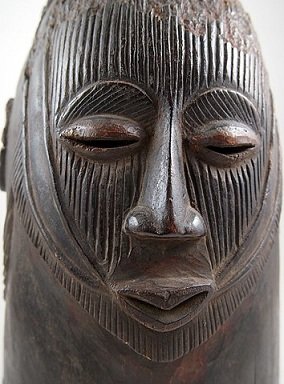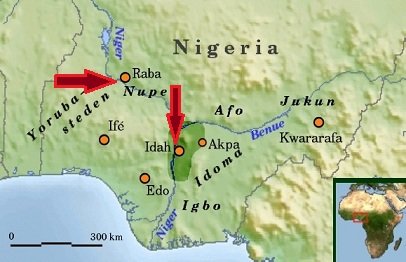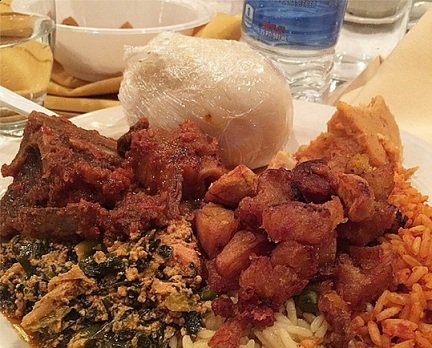ADSactly History : History Of Northern Nigeria [Part 4] - Igala In The Pre-colonia Era
We are continuing in our survey of the Northern part of Nigeria in the pre-colonial era. So far, we have looked at the Hausa/Fulani, Kanem-Bornu, and the Nupe ethnic groups, we also tried to trace their cultural heritage and origin, of which we successfully did. Here, we will look at another ethnic group in Northern Nigerian that has been been grossly side-lined by other larger ethnic groups because of their minority level - this ethnic group is called Igala.

Igala Ethnic Group
Just as a way of reminder, Nigeria is home to over 250 ethnic groups - though the major and politically strategic and influential ones are Hausa/Fulani, Yoruba, and Igbo - but this does not take away the fact that the other "minor" ethnic groups played important roles in the history of Nigeria and the black continent of Africa at large.
If you followed our last post where we reviewed the Nupe kingdom, we made mention of Idah version as one of the Versions of the history of Nupe and the founder of Nupe; Tsoede; was believed to come from Idah. It might interest you to know that Idah (the very place where the founder of Nupe kingdom came from) was the ancestral capital of Igala. So by inference, Igala pre-dated Nupe and was seen as the ancestral parents of Nupe. As a matter of fact, there has been historic assumption by history scholars that Igala dated as far back as the old Oyo empire (Old Yoruba capital).
Igala people are presently found predominantly around the confluence of Niger and Benue rives in the Northern part of Nigeria (areas around Kogi and Benue state) but some other places; even the South-eastern Nigeria; have native Igala speakers. Igala is one of the few ethnic groups that are spread across various parts of Nigeria. The capital of Igala; Idah; shares a common boundary with the Nupe Kingdom that we talked about in our last post, as you can see from the map below.

The population of Igala is just a little above 1.4 million people (according to the 2006 National Population Census) and the religions practised predominantly are Christianity and Islam. Igala people are majorly into farming and fishing, though some practise various forms of trading.
Origin of Igala
Just like the history of the other ethnic groups we reviewed in our previous episodes, Igala's origin has many versions, but much more than that, it has remained very bleak because of lack of proper and adequate records and because of heavy reliance on oral tradition.
Oral tradition is very recognized as a true and valid source of history, the authenticity, however, is not particularly guaranteed - this is the reason an ethnic group can have variations of their origin because of the variation of oral tradition. This is the reason some have linked Igala with Yorubas and some others have linked them with Igbos and the Fulanis, but let's take the version of their origin that is generally accepted by Igala history scholars.
The Version of Abutu Eje
This is the mostly accepted version of the history of Igala. It has been believed that "Igala"; as a name; was gotten from the ancient Yoruba term for antelope. The founder of Igala ethnic group was Abutu Eje who; by literal interpretation; means "a son that was raised by Eje (leopard)". According to oral tradition, Abutu Eje was partly seen as a celestial prince who was sent as a ruler.
When Abutu Eje formed Igala around the 7th century AD, he chose some officials who were called Mela (or Igala Mela) to help him keep and run the sacred and mystery shrine that was entrusted to him by divinity. From that small community he founded, Igala grew and multiplied till this present time. History scholars have said that each of the Melas that was chosen by Abutu Eje (which were about nine) had a different dialect, of which they consolidated on extensively. This can explain why Igala is home to various dialects like Ibaji, Dekina, Ankpa, Ogugu, Ebu and a few others.
Just to let you know, Igala kingdom was so successful during the pre-colonial time that they were able to survive through thick and thin until in the 20th century when they became a protectorate of Britain - okay y'all already know that Nigeria was a British colony.
The Version of Yoruba
Even though this version has been contended by some historians but some Igalas believe it because of the elements of truism in it. If you understand Yoruba language very well and you hear the Igala language, you will agree with me that some words appear in both languages and they mean the same thing. This has led pople to believe that Igala might have had a historic affiliation with the Yorubas in the ancient time [ref].
Asides the similarity between both languages, there are some native Igala people that speak pure Yoruba language - proving that Igala and Yoruba might have shared a common ancestry. Asides the language similarity, they both share some cultural practices and above all, they share similar cuisines, like the Eba Efo Riro. All these are pointing to a shared ancestry.

Igala Administration and Socio-political Organization
The head of administration in Igala is known as Attah. One very unique characteristics of the Igalas is their recognition for female heads. As a matter of fact, Igala has recorded female Attahs in the past - so the title is not just reserved for men as against some other ethnic groups in the Northern part of Nigeria.
For effective leadership, the Attah selects his cabinet which is normally made up of nobles and the elites which are called Igala Mela (or Knights). Just to let you know, one of the Knights of the present Attah is a very renowned Diaspora-based Igala professor of mathematical physics; Gabriel Audu Oyibo. The Attah title is majorly based on kinship - like the current Attah of Igala took over from his father after demise. Some Igalas have significant scarification marks for easy identification - these marks are given on both chins with three lines.
Igala believe well in life after death (or afterlife) and the existence of almighty God who they refer to as "Ojo Ogbekwugbekwu" who they reverence. As against some other Northern ethnic groups where their political head doubles as their religious head, the Attah of Igala is just seen as political head, without having any religious oversight over the land of Igala. Igala administration, even though it is monarchical, has some elements of democratic setting and this feature has remained even till this present time.
Authored by @samminator
Click the coin below to join our Discord Server
)
I must say, I haven't read any pieces about Igala in the past, reading about Igala history and their ethnics from this post gives me deja vu, this is an incredible history post of Igala. Nigeria 🇳🇬 is full of amazing histories, will love to read more of your future historical posts.
Thanks for sharing this incredible post @samminator.
I'm really glad you enjoyed this history piece. Yeah, Nigeria is full of amazing history and I'm proud to share some of them. Another history piece will be coming soon. Thanks for reading buddy
Nigeria has rich historic and cultural heritage, and I'm glad you have taken the task upon yourself to expose the world to the history of Nigeria.
I never knew that the Igalas have links with other ethnic groups. Maybe this is to prove that the existing ethnic groups have common ancestry.
Nice one @samminator
Thanks for the kind words bro. Exactly, some ethnic groups in Nigeria are offspring of others; this is one of the reasons we have so many of them now
You continue with your interesting series on African ethnic groups, @samminator. I value this group and I like that they take women into account in their administrative organization. Reading this, I am curious to know what role women play in the other previous groups. I agree with most people when I think that while oral tradition is accepted and used by many cultures in the world, it must also be said that there is a certain subjectivity in each version offered in that way. We have discovered that the transmission of information in this way, orally, can be changed, distorted and even lost. As for the image of food: it looks delicious! I imagine it's a mixture of rice and meat. Thank you for sharing. ;)
Thanks Nancy. In some ethnic groups in the Northern part of Nigeria, female administrative heads are not so common. Though there are some ethnic groups where women are part of the cabinet, like the Kanem-Bornu, the Magira title is purely reserved for women, which is normally reserved for the mother of the king (the Mai)
This series is getting really interesting. So far, despite the overwhelming amount of information and the thoroughness of it, you have managed to present it very entertaining and clear way.
Interestings fact, especially with all the gender issues in Nigeria and Africa in general. One thing that I have not been able to understand is how African culture, which tends to priviledge women in many respects (as healers, storytellers and family leaders) have kept gender inequality, as it seems to be the case, based on reports from international organizations of feminist movements.
I liked the image of the statue. It looks very well crafted and spiritual.
In most parts of Nigeria, during the pre-colonial era, kingship was based on primogenitureship, where the King's first son becomes the heir apparent and takes over the throne when the king demises. But this does not rule off the fact that there are traditional offices which women occupy.
Thanks for reading buddy
This is another exposition on the history of northern Nigeria. I was particularly impressed by the fact that women can be heads (Attah) in Igala. For me, every other tribe should adopt this.
Nice work @samminator
Exactly buddy. You'd be surprised to know that the first selected Attah of Igala was a female and ever since then, females have be in that position.
Thanks for coming around buddy
There are so many ethnic groups in the northern Nigeria that some people are not aware of. I am glad you have taken time to let us know about them.
Meanwhile, the sight of that food is already making me to salivate.
Thanks for sharing this nice piece @samminator
Yeah there are. Nigeria is a country with very many ethnic groups; over 250; but some of them have been encapsulated into the three major ethnic groups (Hausa/Fulani, Yoruba, and Igbo), and that is the reason people lay less emphasis on them. But some of them played a crucial role in Nigeria's history and they should be honoured for that.
Lol. The food is very common to both Yorubas and Igalas.
Thanks for coming buddy
It will always be of great interest to know the origin of peoples, particularly Nigerian Africans. The dissemination work you are doing on this blog about Nigeria is very valuable.
I was struck by the form of decentralized political organization (you could say), the Igala Mela, which gave rise to the dialects. Also the similarity between the Yoruba and Igala languages. I consider the incorporation of women into the government and state administration to be an important aspect. I was curious about the scarification marks they use for identification.
Thanks for your post, @samminator.
Thanks for the nice comment buddy. Scarification marks are very common in Nigerian ethnic groups. But just like the Igala, other ethnic groups have their own unique marks which will make it easy to identify anyone from there. Though some people, especially those born outside their own ethnic group may not get the marks at birth.
Thanks for reading buddy
Nigeria, a country with diverse cultural and ethnic groups. This is a well-written review of the Igala Ethnic Group that shows the beautiful and rich culture of the Igala people.
Well done man!
Thanks brother. One of the strengths of Nigeria lies in their cultural diversity. Of a truth, there's unity even in the midst of cultural and ethnic diversity.
Thanks for reading
Amazing piece @samminator. If I may ask, which other ethnic group in Nigeria recognizes female heads? Because I'm not sure I've heard about female administrative heads in the ethnic groups in Nigeria. It looks like Igala should be commended for this
Actually, there are other ethnic groups where women can hold certain traditional offices. For example, in some parts of Igbo land, there is the "Ezenwanyi" (queen mother), in Kanem-Bornu, there is the Magira... All these are traditional heads reserved for women. Though Igala's own is different because the Attah is the highest office and can also be occupied by women.
Thanks for reading buddy
Hi Sam!
This is very expository. You went deep to reveal the main facts of Igala history, and I appreciate it in no small measure. Even as a Nigerian, I have heard about Igala but don't know much about them.
Many of our compatriots will find this article educative and enriching.
Thanks for the efforts.
@eurogee
Many thanks brother Eurogee. It has always been an honour to research about the history of Nigeria, and I'm glad you loved the post.
Bless you bro